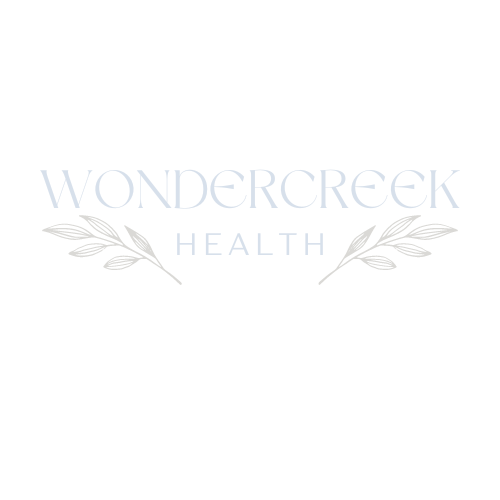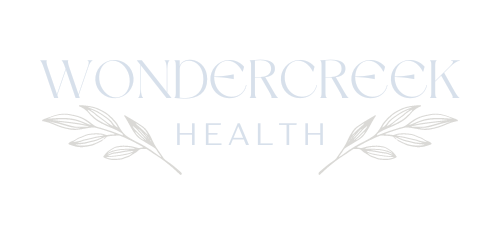PCOS Doesn’t End at 30: What High-Functioning Women Need to Know in Midlife
Anna Harrelson • March 22, 2025
It’s not just about fertility. It’s about your metabolism, hormones, and long-term health—even in perimenopause and beyond.

"You can’t have PCOS anymore, you’re too old."
"You were just estrogen dominant."
"It was probably just your birth control messing with your cycle."
If you’ve heard any of these before, you’re not alone—but they’re not the full story. Polycystic Ovary Syndrome (PCOS)
is one of the most misunderstood and underdiagnosed hormonal conditions in women, especially as we move into midlife.
As a lifestyle medicine physician and menopause specialist, I see so many women in their 40s and 50s who were never properly diagnosed, or who were told their PCOS “resolved” after their twenties. But the truth is, PCOS is not just a reproductive disorder—it’s a lifelong metabolic and neuroendocrine condition that can shape how you experience perimenopause, menopause, and the decades beyond.
Let’s dive into what PCOS really looks like, why so many smart, high-functioning women have been missed or misdiagnosed, and how we can support your hormones, metabolism, and nervous system at midlife and beyond.
What Is PCOS, Really?
Polycystic Ovary Syndrome is a condition of hormonal imbalance, typically involving irregular or absent ovulation, higher levels of androgens (like testosterone or DHEA), and signs like acne, hirsutism, or hair thinning. It’s diagnosed using the Rotterdam criteria, which require two out of three of the following:
- Irregular cycles or lack of ovulation
- Elevated androgens (on labs or symptoms)
- Polycystic-appearing ovaries on ultrasound
But here’s the thing: you don’t need to look like a textbook case to have PCOS. And you don’t have to be overweight, either.
Many women I see had irregular periods in their teens or early 20s, were put on birth control to "regulate" them, and never thought about it again. But under the surface, they may still be dealing with insulin resistance, metabolic dysfunction, and the downstream effects of decades of low ovulatory progesterone.
PCOS in High-Functioning, Chronically Stressed Women
I want to name a pattern I see over and over again in my clinic: high-performing, deeply thoughtful, often anxious women with a history of:
- Childhood trauma or emotional neglect
- Chronic stress, perfectionism, or people-pleasing tendencies
- Neurodivergence or sensory sensitivity
- Head injuries or subtle brain trauma
- Long histories of surviving on willpower alone
These women may have had "normal" labs, been told their hormones were fine, and still feel awful—tired, inflamed, emotionally fragile, or completely burned out. Their PCOS may have never been diagnosed, or it may present now as midlife metabolic dysfunction, vasomotor instability, or nervous system dysregulation.
And because PCOS is so often framed as a fertility problem, it gets missed entirely after age 35.
PCOS Doesn’t Magically Go Away After Menopause
Yes, ovulation stops. But PCOS is not just about ovulation. Women with a history of PCOS:
- Often go through perimenopause with more erratic hormone fluctuations
- May retain higher levels of androgens than peers
- Often experience insulin resistance, stubborn weight gain, and mood swings
- Are at higher risk for type 2 diabetes, cardiovascular disease, fatty liver, and dementia
You may also experience a sudden onset of classic estrogen-deficiency symptoms after years of feeling "estrogen dominant": vaginal dryness, poor sleep, brain fog, hot flashes, or joint pain. This hormonal shift can feel disorienting—especially if you were previously told that you had too much estrogen or testosterone.
So Yes, You Might Still Need Hormones
One of the most common questions I get is:
"If I had PCOS or high estrogen before, why would I ever take hormones in menopause?"
Here’s why:
- PCOS doesn’t protect you from the effects of estrogen and progesterone deficiency
- You may still have low progesterone, especially if you had anovulatory cycles for years
- Testosterone levels decline sharply after menopause, even in women with a PCOS history
And importantly, many women who thrived on higher testosterone levels in their younger years may feel the effects of that decline even earlier—sometimes in late perimenopause rather than after menopause. This can look like a sudden drop in motivation, mental clarity, libido, or muscle tone. While your labs may still appear "in range," they may be low for you, based on where your body functioned best in your 20s or 30s. This is why a personalized approach matters—because it’s not just about numbers on a chart, but about how you feel in your body.
Hormone therapy can help with symptoms, muscle mass, cognition, and overall metabolic health
Of course, it has to be individualized. But fear of hormones due to your "PCOS past" should not be a reason to avoid evidence-based treatment that could dramatically improve your quality of life.
Where Do We Start?
I always begin with:
1. Lifestyle foundations:
- Balanced blood sugar (this is critical)
- Resistance training and muscle-building
- Nervous system regulation (because stress is metabolic)
- Sleep, circadian health, and gut support
2. Supportive supplements (individualized):
Inositol (myo + d-chiro), magnesium, omega-3s, sometimes berberine or NAC
3. Hormone support (when appropriate):
- Bioidentical progesterone for sleep, mood, and cycle regulation
- Estradiol and testosterone for quality of life and long-term disease prevention
- Vaginal estrogen for GSM, even in women with a PCOS history
Final Thoughts
If you have PCOS or suspect you might—even if no one ever told you that you did—you deserve midlife care that goes deeper. You deserve a plan that honors your past hormone story and supports the road ahead.
At Wondercreek Health, I don’t just treat numbers on a lab report. I listen to your lived experience, your history, your intuition. PCOS is real. Your symptoms are real. And there is help.
WonderCreek Health Blog

Many of the women who find their way to me share a common story: They’ve seen multiple specialists. Their labs are “normal.” Their symptoms are scattered across systems—joints, gut, mood, hormones, skin—and yet every provider focuses on one piece at a time, never the whole picture. They’ve often been told they’re anxious, dramatic, or “too sensitive.” And yet, they’re also some of the most intuitive, self-aware, and relentlessly curious patients I’ve ever met. They know their bodies. They know something isn’t right. And they won’t stop searching until someone finally sits down and helps them connect the dots. That’s where connective tissue disorders come in. What Do We Mean by “Connective Tissue Disorders”? When I talk about this group of conditions, I’m referring to women who often fall somewhere on the spectrum of: Hypermobility spectrum disorder (HSD) Ehlers-Danlos features Mast cell activation (MCAS) Endometriosis PMDD and other hormone sensitivities POTS or other dysautonomias The common thread? Their connective tissue is different—looser, more fragile, more reactive. And when the scaffolding of the body isn’t as stable, symptoms spill over into every system: joints, vessels, immune response, mood, hormones, digestion, even the brain. Why Midlife Feels Like a Breaking Point Estrogen has always been a stabilizer. It strengthens collagen, calms mast cells, and helps buffer the nervous system. So, it’s no surprise that perimenopause—when estrogen begins to fluctuate dramatically—can feel like the rug is being pulled out. I see women who: Once held things together with sheer willpower Managed PMDD, migraines, or endometriosis in their younger years Suddenly feel like everything has intensified: joint pain, bloating, histamine reactions, mood shifts, insomnia, brain fog For women with sensitive connective tissue and sensitive nervous systems, hormonal shifts don’t just cause hot flashes—they destabilize the entire body. Hormone Therapy for the Orchid Patient Many of my patients have tried hormones before. Sometimes birth control left them moody, swollen, or miserable. Sometimes a patch or pill was prescribed quickly, with no attention to how sensitive their system might be. So when they hear “hormone therapy,” they’re understandably hesitant. This is where my orchid theory comes in. Orchids are not weak flowers—they’re strong, beautiful, and resilient. But they need careful tending. They don’t thrive when thrown into the same soil or light as every other plant. They require patience, precision, and a slower hand. My connective tissue–sensitive patients are orchids. Their bodies respond to hormone therapy, but they need a methodical, gentle approach: Always bioidentical hormones Introduced slowly, step by step Carefully monitored, with adjustments made gradually Combined with lifestyle strategies to support the nervous system and reduce inflammation This is not a “one patch fits all” process. It’s a partnership. And when done thoughtfully, hormone therapy can bring profound relief and stability. Why Sensitivity Is a Strength The women I see are often neurodivergent—ADHD, autistic traits, or simply highly perceptive. They’re often told their sensitivity is a liability, but I see it differently. That very sensitivity is what helps them notice patterns others miss. It’s what fuels their curiosity to keep searching, even after being dismissed. Their intuition about their own bodies is spot on. Yes, their connective tissue is different. Yes, their mast cells fire more easily. Yes, their hormones seem to create more chaos. But these women are also some of the most resilient, resourceful, and insightful people I know. Moving Forward If you see yourself in this description, please know: You’re not “too sensitive.” You don’t have 27 different diagnoses—you have a pattern that makes sense. Hormones are not off the table for you—they may just need to be approached differently. Your lived experience matters as much as your lab results. This isn’t about fixing you—you are not broken. It’s about giving your body the tailored support it’s been asking for all along. This is just the beginning of a series I’ll be writing on connective tissue–related conditions: MCAS, PMDD, endometriosis, and more. Each deserves its own spotlight. But the first step is recognition. You deserve to be seen in your wholeness—not dismissed as “normal” when everything in your body is telling you otherwise.

You know how people say, "Just drink some water and take a magnesium supplement" like it’s the answer to everything? Well… they’re not totally wrong. But like most good advice, the devil is in the details. Magnesium is one of the most essential minerals in the body, involved in over 300 enzymatic reactions , yet it remains one of the most commonly overlooked deficiencies in midlife women. And no, your annual bloodwork probably didn’t catch it. So What Does Magnesium Actually Do? Think of magnesium as a multitasking background assistant—it keeps the lights on and the gears turning across nearly every body system: Brain & Mood: Regulates GABA and NMDA receptors, supporting calm, focus, and resilience against anxiety and overstimulation. Muscles: Prevents cramping and twitching, supports strength and recovery, and reduces restless legs. Sleep: Plays a role in melatonin production and nervous system regulation. Bowel Function: Helps pull water into the colon to prevent constipation. Cardiovascular Health: Regulates blood pressure and helps with vasodilation. Hormone Balance: Assists in estrogen metabolism and combats insulin resistance. In short: if you’re exhausted, bloated, moody, foggy, tense, or irregular in your gut or cycle—magnesium deserves a spot on your radar. Why Is Magnesium So Important in Midlife? Estrogen and progesterone both influence magnesium levels. As hormone levels decline or fluctuate during perimenopause and menopause, so does your ability to retain and utilize magnesium. Add to that: Chronic stress (which depletes magnesium) Modern diets (often low in magnesium-rich whole foods) Medications like PPIs, diuretics, or certain antibiotics High caffeine, sugar, or alcohol intake (all increase magnesium excretion) And suddenly, a " borderline magnesium issue " becomes a perfect storm. Why Your Blood Test Might Not Show It Serum magnesium tests only reflect ~1% of total body magnesium. Most magnesium is stored in bone and tissue. So it’s very possible to have "normal labs" and still be clinically deficient. In practice, we go by symptoms, risk factors, and therapeutic response. Common Signs of Suboptimal Magnesium Trouble falling or staying asleep Anxiety or nervous system overactivation Fatigue or burnout that doesn’t resolve with rest Muscle cramps, spasms, or eye twitches Constipation Menstrual migraines or tension headaches Joint stiffness or tightness Sugar cravings or blood sugar crashes Best Food Sources of Magnesium Magnesium-rich foods include: Dark leafy greens (spinach, chard) Nuts and seeds (especially pumpkin seeds and almonds) Avocados Legumes Dark chocolate (yes, really!) Whole grains like quinoa and oats That said, many of us still fall short even with a healthy diet, especially during high-stress seasons or if absorption is impaired. Supplements: Which Type of Magnesium Is Best? Not all magnesium is created equal. Here are the forms we most often recommend: Magnesium Glycinate: Best for sleep, anxiety, and muscle relaxation. Gentle on the stomach.** Magnesium Citrate: Useful for constipation, but can cause loose stools at higher doses. Magnesium Threonate: May support cognitive function and brain health. Magnesium Malate: Good for energy and muscle pain, often used in fibromyalgia. We generally avoid magnesium oxide unless constipation is the only concern, as it’s poorly absorbed. **Mag Glycinate is generally my go to recommendation and what we take at our house Also, BLENDS can be good- but generally more expensive Dosing & Timing Most women benefit from 200–400 mg daily, depending on needs. Take it in the evening if you're targeting sleep or relaxation. Divide doses if taking more than 300 mg (e.g. AM + PM). Always start low and go slow, especially with citrate forms to avoid urgent bathroom visits. Final Thoughts If magnesium had better marketing, it would be a top-tier wellness darling. But because it’s quiet, essential, and boring on paper, we tend to overlook it. Yet for so many midlife women, magnesium is the missing link that helps all the other systems and strategies finally click. So if you're doing "everything right" and still feel off? It might be time to start taking magnesium!

